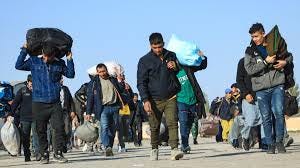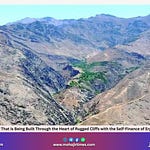Mehdi Bab Al-Hawaeji, Deputy Governor of Tehran: "Today, dealing with illegal migrants is like dealing with wartime; it's like when our youth took up arms and became martyrs, mines were planted around our families."
Mohajir Times: A video of the words of the district governor of Shahr-e-Ray has recently been released on social networks, which reveals his anti-immigrant approach in Iran. Last Sunday, May 19, 2024, Mr. Mehdi Bab-al-Hawaeji, the deputy governor of Tehran and the special district governor of Ray City, called the priority of the supply council of this city "combating illegal migrants".
In a speech characterized by anti-immigrant sentiments, the Special district governor of Rey City likened the fight against what he termed "illegal immigrants" to the Iran-Iraq War. He stated, "Today, dealing with illegal immigrants in Rey County is like confronting them during wartime. It is like the time when our youths took up arms and became martyrs."
The statements by this government official, prioritizing the crackdown on illegal immigrants, reflect the continuation of anti-immigrant policies in Iran, specifically targeting hundreds and thousands of Afghan refugees and migrants, putting them at risk of deportation and street violence. Bab Al-Hawaeji described the presence of immigrants in Iran as "social, economic, and moral landmines" near families and urged government officials to "wake up the boys of Rey City."
He also characterized even those immigrants deemed "legal" as "disruptive" and claimed that there are "certainly disruptors among them." Previously, several members of parliament, military commanders, and the Iranian Minister of Interior had openly threatened Afghan refugees and migrants with expulsion from Iran. According to Iranian officials, over one million Afghan migrants were deported from Iran in 2023 alone. Taliban forces arrested some of the deported refugees upon returning to Afghanistan.
Iranian media sources claim that over eight million Afghans have fled to Iran since the Taliban's return to power. However, Iran's Interior Minister dismissed these figures as inaccurate but affirmed that Iran would return all individuals who entered the country illegally back to Afghanistan.
The wave of anti-refugee and migrant sentiment has led to increased street violence against Afghanistanis in Iran. In 2023, Afghan settlements in at least two cities, Meybod and Eqbalieh, were attacked. An Afghan worker was also killed in Mashhad. Additionally, several Afghans residing in Iran reported being subjected to racist remarks and physical violence on the streets.
Afghan immigrants and refugees, conditioning the extension of their residence permits on a deposit of 100 million Tomans. Despite claims by foreign nationals' affairs offices that this scheme is voluntary, Afghans living in Iran have said and claimed that the renewal of their residency cards and census documents is contingent upon securing this amount. Moreover, some Afghanistani immigrants and refugees allege that even those with valid residency and tourist passports have faced police violence and forced deportation without any legal process to Afghanistan.
One Afghanistani immigrant, who wished to remain anonymous in the report and holds a tourist passport, told Mohajir Times: "When I went to Tehran to renew my passport, the Kafalat office also forced a labor card on me and said that if I did not obtain a 'work permit,' my visa would not be renewed. I had no choice but to get the labor card to renew my visa."
Another Afghanistani migrant recounted: "When I wanted to travel from Tehran to Mashhad with a tourist passport that had a valid visa, the police detained me at the Tehran terminal and deported me, disregarding my visa and passport." Many Afghan immigrants with valid residency also complain about mistreatment, threats of document annulment, and deportation by staff at the Kafalat offices (The offices in charge of extending the permit resident of Afghan immigrants in Iran by receiving cash).














Share this post